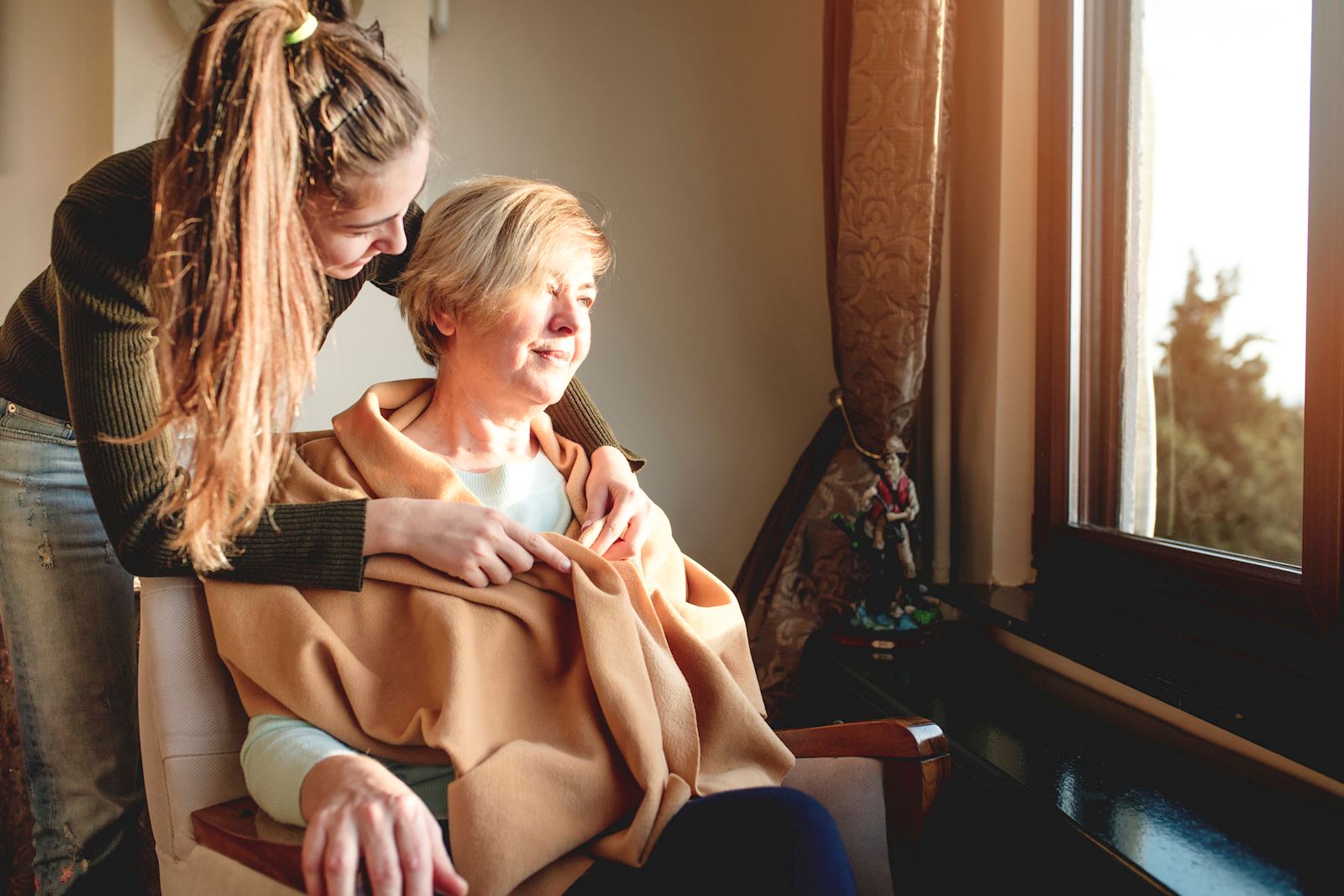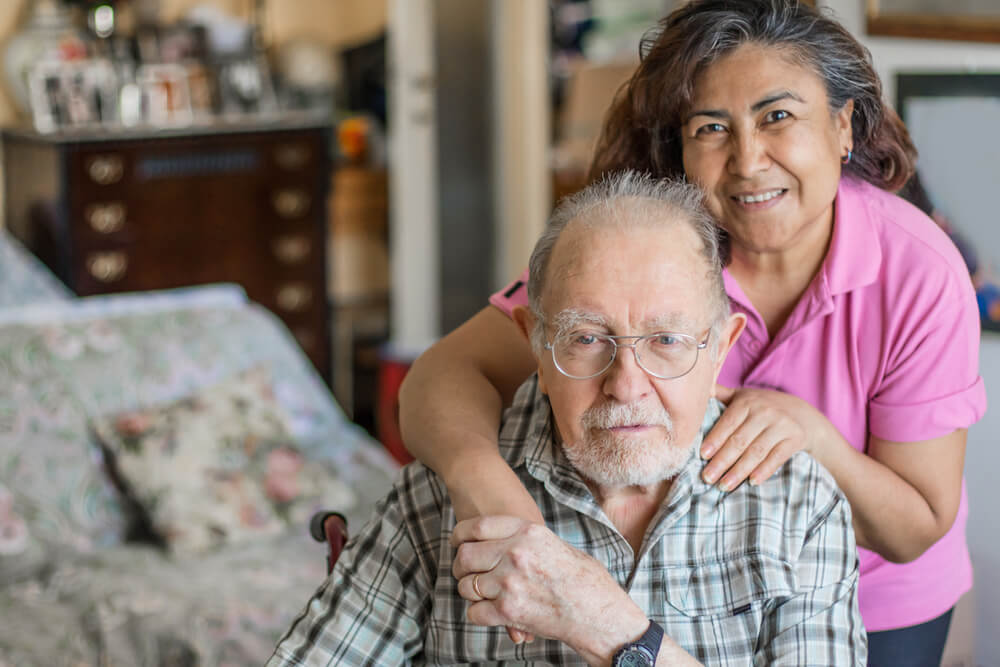Caring for a loved one can often be challenging, and dementia can add an extra layer of complexity and heartache. These tips and insights can help with this journey and remind you to address your own health and well-being.
Communicating with a person with dementia
Communication problems may be a source of frustration for both you and your loved one but using simple language and being patient can help ease those tensions and foster a more positive interaction.
- Encourage two-way conversations if possible.
- Ask questions that give the person choices such as what to eat: “Would you like cottage cheese or apple sauce?”
- Speak calmly and clearly.
- Listen, show understanding and be reassuring. This can help if a person is angry or fearful.
- Dementia can often cause verbal or physical aggression. Aggression is a natural reaction to feeling helpless or afraid.
- Try to avoid escalating the situation by identifying the source, for example physical discomfort or an unfamiliar environment.
- Having familiar or meaningful objects and photos in the house can help a person feel more secure.
- There are also going to be occasions when your loved one becomes confused because of their diminishing cognitive functions. It may help to either present them with a simple explanation or divert their attention elsewhere to help them regain some sense of control.
Above all, no matter the situation, empathize with your loved one. Be patient and try to understand their perspective. Forcing them to adapt to your communication style is unproductive and may do more harm than good.
Helping with everyday routines
Depending on which stage of dementia your loved one is experiencing, you may need to assist them with any number of daily activities that were once routine.
- Planning and managing daily activities:
- Establish a consistent routine and time for dressing, bathing and eating. Set realistic expectations for both of you.
- Set aside time each day for activities they enjoy as well as quiet time.
- Avoid overstimulation with new faces and new environments or especially difficult tasks.
- Help them stay active. Try walking together outside, doing some simple exercises inside, or doing household chores. Make sure whatever the physical activity may be, it matches up to what your loved one can do.
- Assisting with personal hygiene:
- Let them do as much as they can safely on their own.
- Loose fitting clothing with elastic waistbands and large zippers can help them with getting clothes on and off.
- Home modifications:
- Remove tripping hazards such as throw rugs and electrical cords. Try to eliminate uneven walking surfaces.
- Make sure there is at least one handrail by any stairs.
- Install locks or safety latches on cabinets to help keep harmful chemicals, such as cleaning products, out of reach.
- Add a shower chair and handrails in the bathroom.
- Ensure all areas of the home inside and outside are well lit.
Know when to ask for help
For dementia caregivers, 70% report that coordinating care is stressful and say the cost, organizing multiple doctors’ appointments and getting help taking a break are among their top stressors. As the person responsible for providing help, it can often be difficult to ask for it yourself. But it is important to recognize when you can no longer shoulder the responsibility on your own and you are experiencing signs of caregiver stress.
There are several reasons that people decline to hire professional care for their loved one, including cost, logistics and even conflict within the family. But there are also valid reasons to seek out resources, in-home professional support or even hospice care.
Hiring a professional in-home caregiver can provide several benefits:
- Helps avoid caregiver burnout: Provides much-needed breaks, allowing family members to recharge and focus on their own well-being.
- Expertise in dementia care: Professional caregivers have training and experience in managing the unique challenges associated with dementia and other conditions.
- Assistance with daily activities: Helps with tasks such as meal preparation, bathing and medication management, improving the quality of life for the loved one.
- Emergency preparedness: Caregivers are trained to handle emergencies and can respond effectively in critical situations.
- Peace of mind: Families can feel more at ease knowing that their loved one is in capable hands, allowing them to focus on other responsibilities.
Having assistance can also work to resolve feelings of irritation or resentment, especially if you feel like you’re struggling to balance your own life with your caregiving responsibilities. The more severe the dementia, the more demanding caregiving may become. It’s important to start discussions with your loved one early, if possible, to have a plan in place for health care directives when it’s needed.
Resources and support
There are many resources and support available to help people with dementia and their caregivers. Helpful sites include:
- National Institute on Aging (NIA) Alzheimer’s Caregiving: Find free publications on Alzheimer's and dementia, caregiving and healthy aging.
- VA Caregiver Support Programs: Explore options like a caregiver support hotline, a dedicated coordinator for caregivers of veterans and various programs tailored to your needs. Additionally, find resources that offer self-care strategies and practical tips to enhance your well-being.
- Eldercare Locator: Public service that connects older adults and caregivers to support services, housing, transportation and health resources.
- Helping Family and Friends Understand Alzheimer’s Disease: Suggestions for sharing the diagnosis, helping children understand and how to manage personality and behavior changes.
- Family Caregiver Alliance: In-depth information and tips on a variety of caregiving topics and important strategies for maintaining well-being as a caregiver.
Mom’s Meals® can help
To help ease the burden of mealtime, Mom’s Meals offers nine condition-specific menus, which include pureed meals, that are made with high-quality ingredients and delivered direct to homes. Designed by registered dietitians and professional chefs, all meals are crafted in USDA- and FDA-inspected facilities, providing the highest level of compliance with federal regulations governing food production.
Our meals are also useful for caregivers who are looking for good nutrition and want to keep up their strength. With more than 60 tasty options available, there is something to satisfy everyone’s needs and taste buds.



